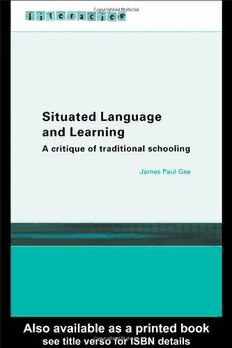
Situated Language and Learning: A Critique of Traditional Schooling PDF
130 Pages·2004·0.885 MB·
Most books are stored in the elastic cloud where traffic is expensive. For this reason, we have a limit on daily download.
Preview Situated Language and Learning: A Critique of Traditional Schooling
Description:
Why do poor and minority students under-perform in school? Do computer games help or hinder learning? What can new research in psychology teach our educational policy-makers?In this major new book, Gee tackles the 'big ideas' about language, literacy and learning, putting forward an integrated theory that crosses disciplinary boundaries, and applying it to some of the very real problems that face educationalists today.Situated Language and Learning looks at the specialist academic varieties of language that are used in disciplines such as mathematics and the sciences. It argues that the language acquisition process needed to learn these forms of language is not given enough attention by schools, and that this places unfair demands on poor and minority students.The book compares this with learning as a process outside the classroom, applying this idea to computer and video games, and exploring the particular processes of learning which take place as a child interacts with others and technology to learn and play. In doing so, Gee examines what video games can teach us about how to improve learning in schools and engages with current debates on subjects such as 'communities of practice' and 'digital literacies'.Bringing together the latest research from a number of disciplines, Situated Language and Learning is a bold and controversial book by a leading figure in the field, and is essential reading for anyone interested in education and language.
See more
The list of books you might like
Most books are stored in the elastic cloud where traffic is expensive. For this reason, we have a limit on daily download.
